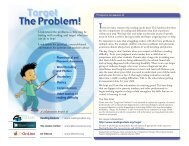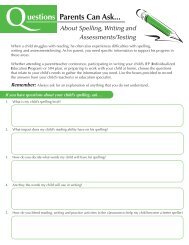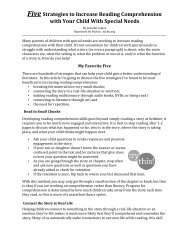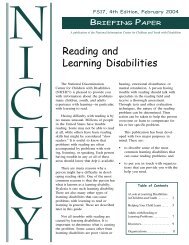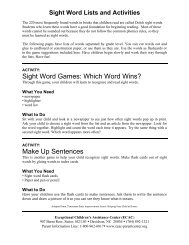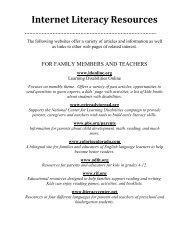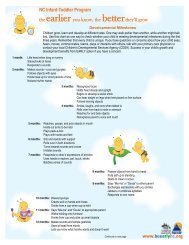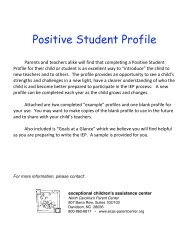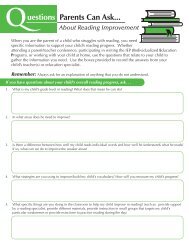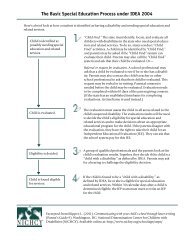Preparing Your Child for Testing - Exceptional Children's Assistance ...
Preparing Your Child for Testing - Exceptional Children's Assistance ...
Preparing Your Child for Testing - Exceptional Children's Assistance ...
Create successful ePaper yourself
Turn your PDF publications into a flip-book with our unique Google optimized e-Paper software.
Tips to Help Prepare <strong>Your</strong> <strong>Child</strong> <strong>for</strong> <strong>Testing</strong> Parents and families can help to create a positive test-‐taking experience and help students prepare <strong>for</strong> tests. Here are some ideas. THROUGHOUT THE YEAR • Make sure your child gets enough sleep, eats properly, and gets to school on time. During test time, make this a special ef<strong>for</strong>t. • Encourage your child to READ, READ, READ. No activity is linked to academic success as much as reading. Even the math portion on the state test uses word problems to test problem-‐solving ability. • Write test dates on your home calendar. Ask your child’s teacher <strong>for</strong> a list of the test dates. • Talk with your child’s teacher(s) often to see what you can do at home to support our child’s work in school. Review all progress reports and report cards. Talk with your child’s teacher if you have concerns. • Review your child’s previous year’s test report. • Encourage your child to participate in practice-‐test opportunities. • If your child is having difficulty with a subject, call the school and ask if extra support in that subject is offered. • Praise your children <strong>for</strong> working hard and <strong>for</strong> the things they do well. • Set times each day <strong>for</strong> study and homework. • Ask about homework every day, and check to see that it is completed. • Give your child a quiet, well-‐lit, com<strong>for</strong>table place to study. • Help your child practice test questions. Review the test together so you will all get familiar with the expectations. Ask your child’s teacher <strong>for</strong> copies of practice questions. • If your child has a disability, meet with the Individualized Education Plan (IEP) Team or 504 Team to decide how your child will participate. A student with a disability is entitled to receive appropriate accommodations <strong>for</strong> test taking, similar to the ones they need <strong>for</strong> everyday learning.
THE DAY OF THE TEST • Make sure that your child is well rested and eats breakfast. • See that your child arrives at school on time and relaxed. • Com<strong>for</strong>t counts. Send a sweater if it’s a cool day. Dress in layers <strong>for</strong> a warm day. • Send along all the needed tools-‐sharpened pencils, pens, rulers, etc. • Encourage your child to do the best work possible and to have a positive attitude. • Encourage your child to listen/read carefully to all test-‐taking directions and to ask questions if any directions are unclear. • Remind your child not to get stuck on any one item. • Encourage your child to check <strong>for</strong> accuracy if time permits. AFTER THE TEST Once you have received the results and reviewed them… • Identify areas of strengths and weaknesses. For example, were scores higher in math or English? Were your child’s math skills stronger in computation or in solving word problems? <strong>Your</strong> child’s teacher can help you. • Praise your child’s testing strengths and make a plan to address identified weaknesses. • If your child’s score is not consistent with his or her grades, contact your child’s teacher or counselor. • See your child’s teacher if you need additional help to understand how your child did on the test. Remember-‐you are very important to your child’s success in school and in life. <strong>Your</strong> interest and support lets your child know you believe in him or her and that you value education. We hope these suggestions help you help your child be successful in school and in life. 2
TO REDUCE TEST ANXIETY “TEST ANXIETY” is worrying too much about doing well on a test. It can keep students from doing their best. Some ways to help reduce anxiety are: • Talk about the test in a positive way. • Encourage best ef<strong>for</strong>ts, yet have realistic expectations. • Encourage your child to focus on his or her strengths, such as a good memory or strong analytical skills. • Assure your child that the test is only one measure of academic per<strong>for</strong>mance. • Emphasize that test scores do not determine a person’s worth. • Find out whether or not your child’s school offers test-‐taking practice or preparation. Adapted from “Helping <strong>Your</strong> <strong>Child</strong> Prepare <strong>for</strong> MCAS” Parents’ PLACE www.pplace.org <strong>Exceptional</strong> <strong>Child</strong>ren’s <strong>Assistance</strong> Center (ECAC)907 Barra Row, Suites 102/103 • Davidson, NC 28036 • (704) 892-1321Parent In<strong>for</strong>mation Line: 1-800-962-6817• www.ecac-parentcenter.org3



